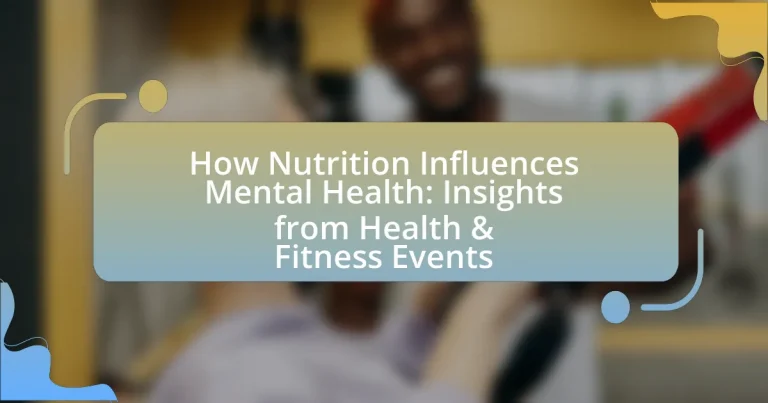The article examines the significant impact of nutrition on mental health, emphasizing how essential nutrients such as omega-3 fatty acids, B vitamins, and minerals influence brain function and emotional well-being. It highlights research linking balanced diets to lower rates of depression and anxiety, while also addressing the negative effects of processed foods on mental health. Additionally, the article explores how health and fitness events can enhance nutritional awareness and support mental well-being through educational initiatives and community engagement. Practical strategies for improving mental health through nutrition, including meal planning and avoiding unhealthy snacks, are also discussed.

How does nutrition impact mental health?
Nutrition significantly impacts mental health by influencing brain function and emotional well-being. Nutrients such as omega-3 fatty acids, vitamins, and minerals play crucial roles in neurotransmitter synthesis and brain structure. For instance, a study published in the journal “Nutritional Neuroscience” found that diets rich in omega-3s are associated with lower rates of depression and anxiety. Additionally, deficiencies in vitamins like B12 and D have been linked to cognitive decline and mood disorders. Therefore, a balanced diet can enhance mental health by providing essential nutrients that support brain health and emotional stability.
What are the key nutrients that influence mental well-being?
Key nutrients that influence mental well-being include omega-3 fatty acids, B vitamins, vitamin D, magnesium, and antioxidants. Omega-3 fatty acids, found in fish and flaxseeds, are essential for brain health and have been linked to reduced symptoms of depression and anxiety. B vitamins, particularly B6, B12, and folate, play a crucial role in neurotransmitter synthesis, impacting mood regulation. Vitamin D, obtained from sunlight and certain foods, is associated with mood improvement and cognitive function. Magnesium, present in leafy greens and nuts, helps regulate neurotransmitters and may alleviate symptoms of anxiety. Antioxidants, found in fruits and vegetables, combat oxidative stress, which is linked to mental health disorders. Studies have shown that diets rich in these nutrients correlate with better mental health outcomes, reinforcing their importance in overall well-being.
How do vitamins and minerals affect mood and cognition?
Vitamins and minerals significantly influence mood and cognition by supporting brain function and neurotransmitter synthesis. For instance, deficiencies in B vitamins, particularly B6, B12, and folate, have been linked to increased risk of depression and cognitive decline, as these vitamins are essential for the production of neurotransmitters like serotonin and dopamine. Additionally, minerals such as magnesium and zinc play critical roles in brain health; magnesium deficiency has been associated with anxiety and mood disorders, while zinc is vital for cognitive function and emotional regulation. Research published in the journal “Nutrients” highlights that adequate intake of these nutrients can enhance mood stability and cognitive performance, demonstrating the direct impact of vitamins and minerals on mental health.
What role do omega-3 fatty acids play in mental health?
Omega-3 fatty acids play a crucial role in mental health by supporting brain function and reducing symptoms of depression and anxiety. Research indicates that omega-3s, particularly EPA and DHA, are essential for maintaining neuronal structure and function, which can influence mood regulation. A meta-analysis published in the Journal of Clinical Psychiatry found that omega-3 supplementation significantly reduced depressive symptoms in individuals with major depressive disorder. Additionally, studies have shown that populations with higher dietary intake of omega-3s report lower levels of anxiety and depression, highlighting their importance in mental well-being.
Why is a balanced diet essential for mental health?
A balanced diet is essential for mental health because it provides the necessary nutrients that support brain function and emotional well-being. Nutrients such as omega-3 fatty acids, vitamins, and minerals play critical roles in neurotransmitter synthesis and brain structure. For instance, research published in the journal “Nutritional Neuroscience” indicates that diets rich in fruits, vegetables, whole grains, and healthy fats are associated with a lower risk of depression and anxiety. Additionally, deficiencies in specific nutrients, like B vitamins and magnesium, have been linked to increased symptoms of mental health disorders. Thus, a balanced diet directly influences mental health by ensuring the brain receives the essential components it needs to function optimally.
How does diet quality correlate with mental health outcomes?
Diet quality significantly correlates with mental health outcomes, as higher-quality diets are associated with improved mental well-being. Research indicates that diets rich in fruits, vegetables, whole grains, and healthy fats can reduce the risk of depression and anxiety. For instance, a study published in the journal “Nutritional Neuroscience” found that individuals adhering to a Mediterranean diet experienced lower levels of depressive symptoms compared to those with poorer dietary patterns. This correlation suggests that nutrient-dense foods may positively influence brain function and emotional regulation, thereby enhancing mental health.
What are the effects of processed foods on mental well-being?
Processed foods negatively impact mental well-being by contributing to increased rates of anxiety and depression. Research indicates that diets high in processed foods, which often contain added sugars, unhealthy fats, and artificial additives, are linked to poorer mental health outcomes. A study published in the American Journal of Psychiatry found that individuals consuming a diet rich in processed foods had a 58% higher risk of developing depression compared to those who consumed a whole-food diet. This correlation suggests that the nutritional quality of food plays a significant role in mental health, emphasizing the importance of dietary choices for psychological well-being.
How can nutrition be integrated into mental health treatment?
Nutrition can be integrated into mental health treatment by incorporating dietary interventions that target specific nutrient deficiencies linked to mental health disorders. Research indicates that omega-3 fatty acids, B vitamins, and minerals like magnesium and zinc play crucial roles in brain function and mood regulation. For instance, a study published in the journal “Nutritional Neuroscience” found that individuals with depression often have lower levels of omega-3 fatty acids, suggesting that supplementation could improve symptoms. Additionally, a balanced diet rich in fruits, vegetables, whole grains, and lean proteins can enhance overall mental well-being by supporting neurotransmitter function and reducing inflammation. By collaborating with nutritionists, mental health professionals can create personalized dietary plans that complement therapeutic approaches, ultimately leading to improved patient outcomes.
What dietary changes can support therapy and medication?
Dietary changes that can support therapy and medication include increasing the intake of omega-3 fatty acids, antioxidants, and whole foods while reducing processed foods and sugars. Omega-3 fatty acids, found in fish like salmon and walnuts, have been shown to improve mood and cognitive function, which can enhance the effectiveness of mental health therapies. Antioxidants, present in fruits and vegetables, combat oxidative stress linked to mental health disorders. A study published in the journal “Nutritional Neuroscience” found that diets rich in whole foods are associated with lower rates of depression and anxiety. Reducing processed foods and sugars can stabilize blood sugar levels, which is crucial for maintaining mood stability.
How do health and fitness events promote nutritional awareness?
Health and fitness events promote nutritional awareness by providing educational resources and interactive experiences that highlight the importance of proper nutrition for overall health. These events often feature workshops, cooking demonstrations, and expert talks that inform attendees about balanced diets, nutrient-rich foods, and the impact of nutrition on physical and mental well-being. For instance, a study published in the Journal of Nutrition Education and Behavior found that participants in health fairs reported increased knowledge about healthy eating and improved dietary habits following the event. This direct engagement fosters a deeper understanding of nutritional principles, encouraging individuals to make informed dietary choices that can enhance their mental health.

What insights can be gained from health and fitness events regarding nutrition and mental health?
Health and fitness events provide valuable insights into the relationship between nutrition and mental health by highlighting the impact of dietary choices on psychological well-being. Research indicates that a balanced diet rich in fruits, vegetables, whole grains, and omega-3 fatty acids can enhance mood and reduce symptoms of anxiety and depression. For instance, a study published in the journal “Nutritional Neuroscience” found that individuals who adhered to a Mediterranean diet reported lower levels of depression and anxiety compared to those with a standard Western diet. Additionally, these events often feature expert speakers who discuss the importance of nutrition in mental health, emphasizing how specific nutrients can influence brain function and emotional regulation. This information reinforces the understanding that proper nutrition is not only essential for physical health but also plays a critical role in maintaining mental well-being.
How do health and fitness events educate participants about nutrition?
Health and fitness events educate participants about nutrition through workshops, seminars, and interactive sessions led by nutrition experts. These events provide evidence-based information on dietary choices, meal planning, and the impact of nutrition on overall health and mental well-being. For instance, studies show that proper nutrition can significantly influence mental health outcomes, such as reducing anxiety and depression symptoms. By incorporating practical demonstrations and personalized advice, these events empower participants to make informed dietary decisions that enhance their physical and mental health.
What types of workshops are commonly offered at these events?
Commonly offered workshops at health and fitness events include nutrition education, mindfulness and stress management, cooking demonstrations, and exercise classes tailored to mental well-being. These workshops aim to provide participants with practical skills and knowledge that link nutrition to mental health, emphasizing the importance of dietary choices in enhancing mood and cognitive function. For instance, research indicates that omega-3 fatty acids found in certain foods can improve mood and reduce symptoms of depression, reinforcing the relevance of nutrition-focused workshops in promoting mental health.
How do expert speakers influence attendees’ understanding of nutrition?
Expert speakers influence attendees’ understanding of nutrition by providing evidence-based information and practical insights that enhance knowledge retention. These speakers often utilize their expertise to clarify complex nutritional concepts, making them accessible and relatable to diverse audiences. For instance, studies show that presentations incorporating visual aids and interactive discussions significantly improve comprehension and engagement, leading to better retention of nutritional information. Additionally, expert speakers often share personal experiences and case studies, which help attendees connect theoretical knowledge to real-life applications, further solidifying their understanding of nutrition’s impact on mental health.
What role do community and support play in nutrition education at events?
Community and support play a crucial role in nutrition education at events by fostering an environment of shared learning and motivation. When individuals participate in nutrition-focused events, the presence of a supportive community enhances engagement and encourages adherence to healthy practices. Research indicates that social support can significantly influence dietary behaviors, as individuals are more likely to adopt and maintain healthy eating habits when they feel connected to others who share similar goals. For instance, a study published in the Journal of Nutrition Education and Behavior found that participants in group-based nutrition programs reported higher satisfaction and improved dietary outcomes compared to those who learned in isolation. This demonstrates that community and support not only facilitate knowledge transfer but also promote accountability and sustained behavior change in nutrition education settings.
How can group activities enhance learning about nutrition?
Group activities enhance learning about nutrition by fostering collaboration and engagement among participants. When individuals work together in a group setting, they can share diverse perspectives, experiences, and knowledge about nutrition, which leads to a deeper understanding of dietary concepts. Research indicates that social learning environments, such as group activities, can improve retention of information and encourage behavior change, as individuals are more likely to adopt healthy eating habits when they feel supported by peers. For example, a study published in the Journal of Nutrition Education and Behavior found that participants in group-based nutrition education programs reported increased knowledge and improved dietary practices compared to those who learned individually. This evidence supports the effectiveness of group activities in enhancing nutrition education.
What are the benefits of networking with nutrition professionals at events?
Networking with nutrition professionals at events provides access to valuable knowledge, collaboration opportunities, and industry insights. Engaging with experts allows individuals to share the latest research and trends in nutrition, which can enhance understanding of how dietary choices impact mental health. For instance, studies have shown that specific nutrients can influence mood and cognitive function, making these discussions crucial for professionals aiming to improve mental health outcomes through nutrition. Additionally, networking fosters partnerships that can lead to innovative programs or initiatives, ultimately benefiting both practitioners and their clients.
How do health and fitness events promote mental health through nutrition?
Health and fitness events promote mental health through nutrition by providing participants with access to healthy food options and educational resources about nutrition. These events often feature workshops, cooking demonstrations, and nutrition talks that emphasize the importance of a balanced diet rich in vitamins, minerals, and omega-3 fatty acids, which are linked to improved mood and cognitive function. Research indicates that diets high in fruits, vegetables, and whole grains can reduce symptoms of anxiety and depression, supporting the idea that nutrition plays a crucial role in mental well-being. For instance, a study published in the journal “Nutritional Neuroscience” found that individuals who adhered to a Mediterranean diet experienced lower levels of depression. By fostering an environment that encourages healthy eating habits, health and fitness events contribute to better mental health outcomes for attendees.
What initiatives are taken to raise awareness about the link between diet and mental health?
Initiatives to raise awareness about the link between diet and mental health include public health campaigns, educational programs, and community workshops. For example, organizations like the Mental Health Foundation in the UK have launched campaigns that emphasize the importance of nutrition in mental well-being, providing resources and guidelines on how specific dietary choices can impact mental health. Additionally, events such as the Food and Mood Conference bring together researchers and practitioners to discuss the latest findings on nutrition’s role in mental health, fostering collaboration and knowledge sharing. These initiatives are supported by research indicating that diets rich in fruits, vegetables, and omega-3 fatty acids are associated with lower rates of depression and anxiety, highlighting the critical connection between what we eat and our mental health.
How do success stories shared at events inspire dietary changes?
Success stories shared at events inspire dietary changes by providing relatable examples of transformation and motivation. When individuals hear firsthand accounts of others who have successfully improved their health through dietary adjustments, it creates a sense of possibility and encourages them to adopt similar changes. Research indicates that storytelling can significantly influence behavior; for instance, a study published in the Journal of Health Communication found that narratives can enhance the perceived relevance of health information, leading to increased motivation for dietary modifications. This connection between personal experiences and actionable insights fosters a supportive environment that promotes healthier eating habits.

What practical steps can individuals take to improve mental health through nutrition?
Individuals can improve mental health through nutrition by incorporating a balanced diet rich in whole foods, including fruits, vegetables, whole grains, lean proteins, and healthy fats. Research indicates that diets high in omega-3 fatty acids, found in fish and flaxseeds, can reduce symptoms of depression and anxiety. Additionally, consuming adequate amounts of vitamins and minerals, such as B vitamins, vitamin D, and magnesium, supports brain function and mood regulation. A study published in the journal “Nutritional Neuroscience” found that individuals who followed a Mediterranean diet experienced lower levels of depression. Regular hydration is also crucial, as dehydration can negatively impact cognitive function and mood.
How can one create a balanced meal plan for mental well-being?
To create a balanced meal plan for mental well-being, one should focus on incorporating a variety of nutrient-dense foods that support brain health. This includes consuming adequate amounts of omega-3 fatty acids found in fish, antioxidants from fruits and vegetables, whole grains for sustained energy, and lean proteins to support neurotransmitter function. Research indicates that diets rich in these nutrients can reduce symptoms of depression and anxiety, as evidenced by a study published in the journal “Nutritional Neuroscience,” which found that individuals consuming a Mediterranean diet experienced improved mood and cognitive function. By prioritizing these food groups, one can effectively enhance mental well-being through nutrition.
What foods should be prioritized for optimal mental health?
Foods that should be prioritized for optimal mental health include fatty fish, leafy greens, nuts, seeds, whole grains, and fermented foods. Fatty fish, such as salmon and mackerel, are rich in omega-3 fatty acids, which have been shown to reduce symptoms of depression and anxiety. Leafy greens like spinach and kale provide essential vitamins and minerals that support brain function. Nuts and seeds are excellent sources of healthy fats and antioxidants, which can improve mood and cognitive function. Whole grains, such as oats and brown rice, help regulate blood sugar levels, contributing to stable energy and mood. Fermented foods, like yogurt and kimchi, promote gut health, which is increasingly linked to mental well-being through the gut-brain axis. Research indicates that a balanced diet incorporating these foods can significantly enhance mental health outcomes.
How can meal prepping support healthy eating habits?
Meal prepping supports healthy eating habits by providing structured meal plans that promote balanced nutrition and portion control. By preparing meals in advance, individuals can ensure they have access to nutritious options, reducing the likelihood of impulsive, unhealthy food choices. Research indicates that meal prepping can lead to increased vegetable intake and decreased consumption of processed foods, which are linked to better mental health outcomes. A study published in the Journal of Nutrition found that individuals who engage in meal preparation are more likely to meet dietary guidelines, thereby enhancing overall well-being and mental health.
What are some common dietary pitfalls to avoid for better mental health?
Common dietary pitfalls to avoid for better mental health include excessive sugar intake, high consumption of processed foods, and inadequate omega-3 fatty acids. Excessive sugar can lead to mood swings and increased anxiety, as studies show that high sugar diets are linked to depression. Processed foods often contain unhealthy fats and additives that can negatively impact brain function and mood stability. Additionally, a deficiency in omega-3 fatty acids, found in fish and flaxseeds, has been associated with an increased risk of depression, as research indicates that these fats play a crucial role in brain health and emotional regulation.
How can sugar and caffeine consumption affect mood?
Sugar and caffeine consumption can significantly affect mood by influencing energy levels and neurotransmitter activity. High sugar intake can lead to rapid spikes in blood glucose, followed by crashes that may result in irritability and mood swings. Research indicates that excessive sugar consumption is linked to increased risk of depression and anxiety, as it can disrupt the balance of neurotransmitters like serotonin, which is crucial for mood regulation.
Caffeine, on the other hand, acts as a stimulant that can enhance alertness and improve mood temporarily. However, excessive caffeine intake may lead to increased anxiety and jitteriness, negatively impacting overall mood. Studies have shown that moderate caffeine consumption can improve mood and cognitive performance, but high doses can lead to negative effects, including heightened stress responses.
In summary, both sugar and caffeine can have complex effects on mood, with sugar potentially leading to negative emotional states and caffeine providing temporary boosts but also risks of anxiety when consumed in excess.
What strategies can help reduce reliance on unhealthy snacks?
To reduce reliance on unhealthy snacks, individuals can implement strategies such as meal prepping, incorporating healthier alternatives, and practicing mindful eating. Meal prepping allows for the availability of nutritious options, making it less likely to reach for unhealthy snacks. Incorporating healthier alternatives, such as fruits, nuts, or yogurt, provides satisfying options that fulfill cravings without the negative health impacts. Mindful eating encourages awareness of hunger cues and promotes better food choices, reducing impulsive snacking behaviors. Research indicates that these strategies can lead to improved dietary habits and overall mental well-being, as a balanced diet is linked to better mental health outcomes.
What resources are available for ongoing nutrition education?
Ongoing nutrition education resources include online courses, workshops, webinars, and nutrition-focused apps. For instance, platforms like Coursera and edX offer courses from accredited institutions on nutrition science and dietary practices. Additionally, organizations such as the Academy of Nutrition and Dietetics provide webinars and resources for both professionals and the public. Research indicates that continuous education in nutrition can significantly improve dietary habits and overall health outcomes, as evidenced by studies showing that informed individuals make healthier food choices.
How can individuals stay informed about the latest nutrition research?
Individuals can stay informed about the latest nutrition research by subscribing to reputable scientific journals, following nutrition-focused organizations, and attending health and fitness events. Subscribing to journals like the “American Journal of Clinical Nutrition” or “Nutrition Reviews” provides access to peer-reviewed studies. Organizations such as the Academy of Nutrition and Dietetics regularly publish updates and guidelines based on current research. Additionally, participating in health and fitness events often features expert speakers who present the latest findings in nutrition, allowing individuals to gain insights directly from researchers and practitioners in the field.
What role do online communities play in supporting nutritional goals?
Online communities play a significant role in supporting nutritional goals by providing social support, sharing resources, and fostering accountability among members. These platforms enable individuals to connect with others who have similar dietary objectives, which can enhance motivation and adherence to nutritional plans. Research indicates that social support from online communities can lead to improved dietary behaviors and weight management, as members often share success stories, recipes, and tips that reinforce healthy eating habits. Additionally, the interactive nature of these communities allows for real-time feedback and encouragement, which can be crucial for maintaining commitment to nutritional goals.





